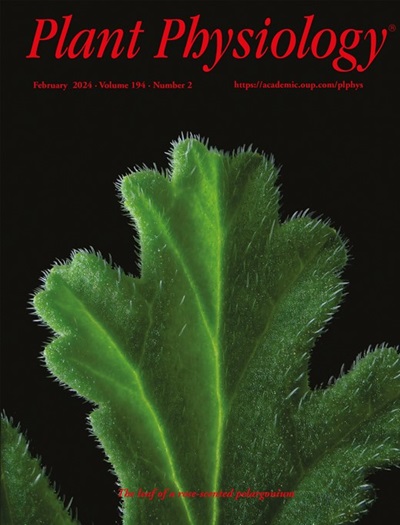Nectary starch degradation affects nectar chemical composition, but not nectar sugars, in Arabidopsis thaliana
IF 6.9
1区 生物学
Q1 PLANT SCIENCES
引用次数: 0
Abstract
Attracting and rewarding pollinators is important for the reproduction of many flowering plants, and floral nectar plays a central role in plant-pollinator relationships as the primary reward. Nectar production by floral organs called nectaries coincides with a build-up and degradation of nectary starch in many species. While this temporal connection might suggest that nectar sugars are produced from nectary starch, direct evidence to support this idea is lacking. Here, we performed genetic manipulations to test how nectary starch contributes to nectar production in Arabidopsis (Arabidopsis thaliana). Additionally, we conducted semi-targeted metabolomics experiments to identify which nectar compounds (NCs) depend on nectary starch for their production and secretion. While nectar sugar levels were not consistently lower in plants defective in nectary starch metabolism, mutants producing more nectary starch consistently produced less nectar sugar. We also detected a number of differentially accumulated NCs connected to biotic stress in starch-related mutants, including salicylic acid. Our results suggest that, in Arabidopsis, nectary starch is not required as a carbohydrate source to produce nectar sugars per se, but nectary starch metabolism is important for the production and secretion of specialized NCs, which may help nectaries respond to stress. NCs identified from our metabolomics experiment provide the foundation for further investigations into the functional and physiological importance of nectary starch in nectar and floral biology.在拟南芥中,蜜淀粉降解影响花蜜的化学成分,但不影响花蜜糖
吸引和奖励传粉者对许多开花植物的繁殖非常重要,花蜜作为主要的奖励在植物-传粉者关系中起着核心作用。在许多物种中,被称为蜜腺的花器官的花蜜生产与蜜淀粉的积累和降解相一致。虽然这种时间上的联系可能表明花蜜糖是由蜜淀粉产生的,但缺乏支持这一观点的直接证据。在这里,我们进行了基因操作来测试蜜淀粉如何促进拟南芥(拟南芥)的花蜜生产。此外,我们进行了半靶向代谢组学实验,以确定哪些花蜜化合物(nc)依赖于蜜淀粉的产生和分泌。虽然在蜜淀粉代谢缺陷的植物中,花蜜糖水平并不总是较低,但产生更多蜜淀粉的突变体始终产生较少的花蜜糖。我们还在淀粉相关突变体(包括水杨酸)中检测到许多与生物应激相关的不同积累的NCs。我们的研究结果表明,在拟南芥中,花蜜淀粉本身并不需要作为碳水化合物来源来产生花蜜糖,但花蜜淀粉的代谢对于特殊nc的产生和分泌很重要,这可能有助于花蜜对应激的反应。从代谢组学实验中鉴定出的NCs为进一步研究蜜淀粉在花蜜和花生物学中的功能和生理重要性提供了基础。
本文章由计算机程序翻译,如有差异,请以英文原文为准。
求助全文
约1分钟内获得全文
求助全文
来源期刊

Plant Physiology
生物-植物科学
CiteScore
12.20
自引率
5.40%
发文量
535
审稿时长
2.3 months
期刊介绍:
Plant Physiology® is a distinguished and highly respected journal with a rich history dating back to its establishment in 1926. It stands as a leading international publication in the field of plant biology, covering a comprehensive range of topics from the molecular and structural aspects of plant life to systems biology and ecophysiology. Recognized as the most highly cited journal in plant sciences, Plant Physiology® is a testament to its commitment to excellence and the dissemination of groundbreaking research.
As the official publication of the American Society of Plant Biologists, Plant Physiology® upholds rigorous peer-review standards, ensuring that the scientific community receives the highest quality research. The journal releases 12 issues annually, providing a steady stream of new findings and insights to its readership.
 求助内容:
求助内容: 应助结果提醒方式:
应助结果提醒方式:


